Comprehensive Report: Operations and Service Management at Tesco
VerifiedAdded on 2023/01/13
|10
|3089
|58
Report
AI Summary
This report provides a comprehensive analysis of operations and service management practices within Tesco, a leading global retail supermarket chain. It identifies quality management as a key operational practice, emphasizing its role in enhancing efficiency through quality planning, assurance, and control. The report critically examines the impact of these practices on Tesco's efficiency, highlighting the application of TQM and Six Sigma methodologies. Furthermore, it evaluates the implementation of technology in organizational processes, focusing on digital transformation and the use of tools like computers, tablets, and smartphones to streamline workflows, improve communication, and enhance customer experience. The report also identifies supporting functions, such as finance, that are linked to operations management practices, underscoring their importance in ensuring effective and efficient operations. The study concludes by emphasizing the significance of continuous improvement and technological adoption in maintaining a competitive edge in the retail sector.
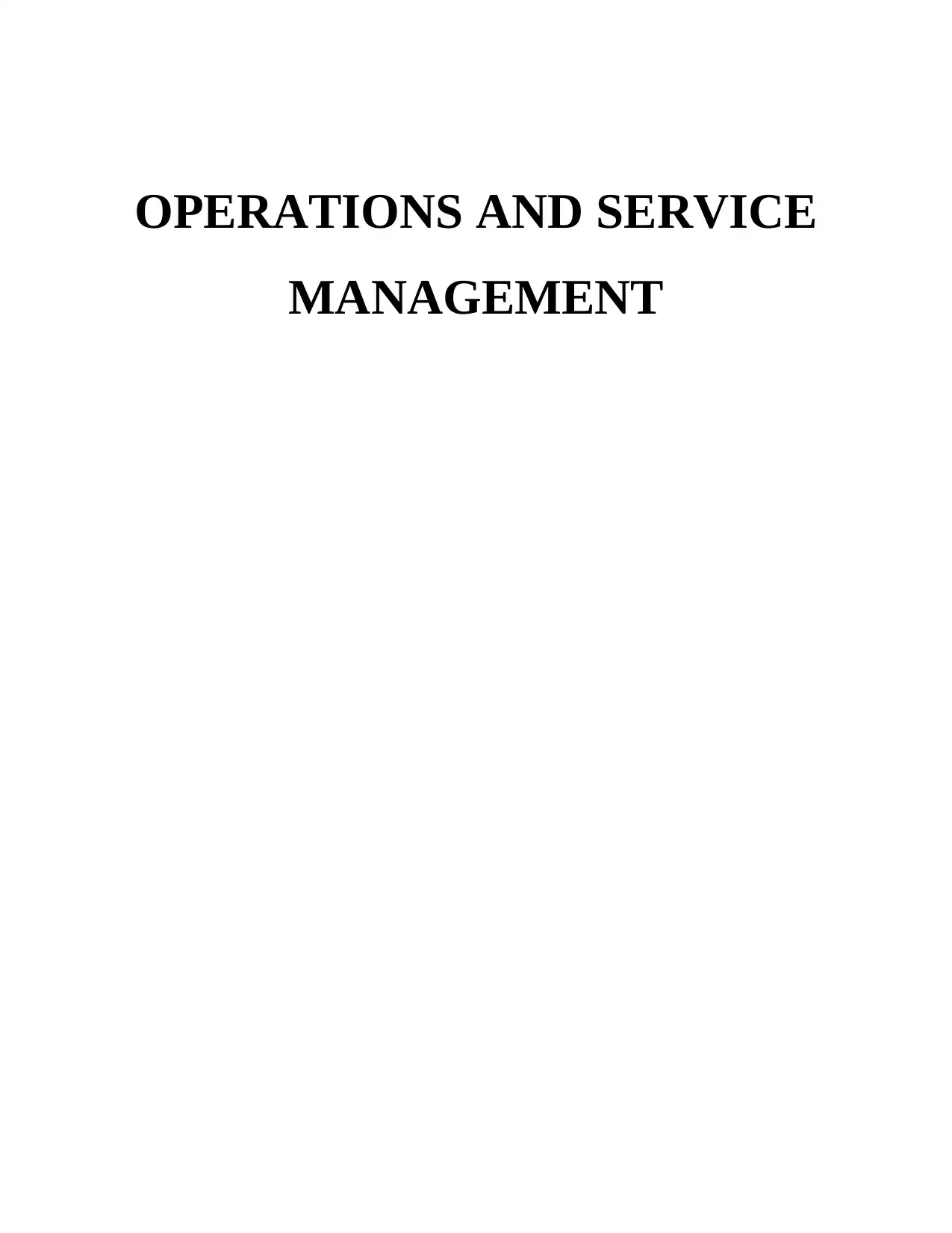
OPERATIONS AND SERVICE
MANAGEMENT
MANAGEMENT
Paraphrase This Document
Need a fresh take? Get an instant paraphrase of this document with our AI Paraphraser
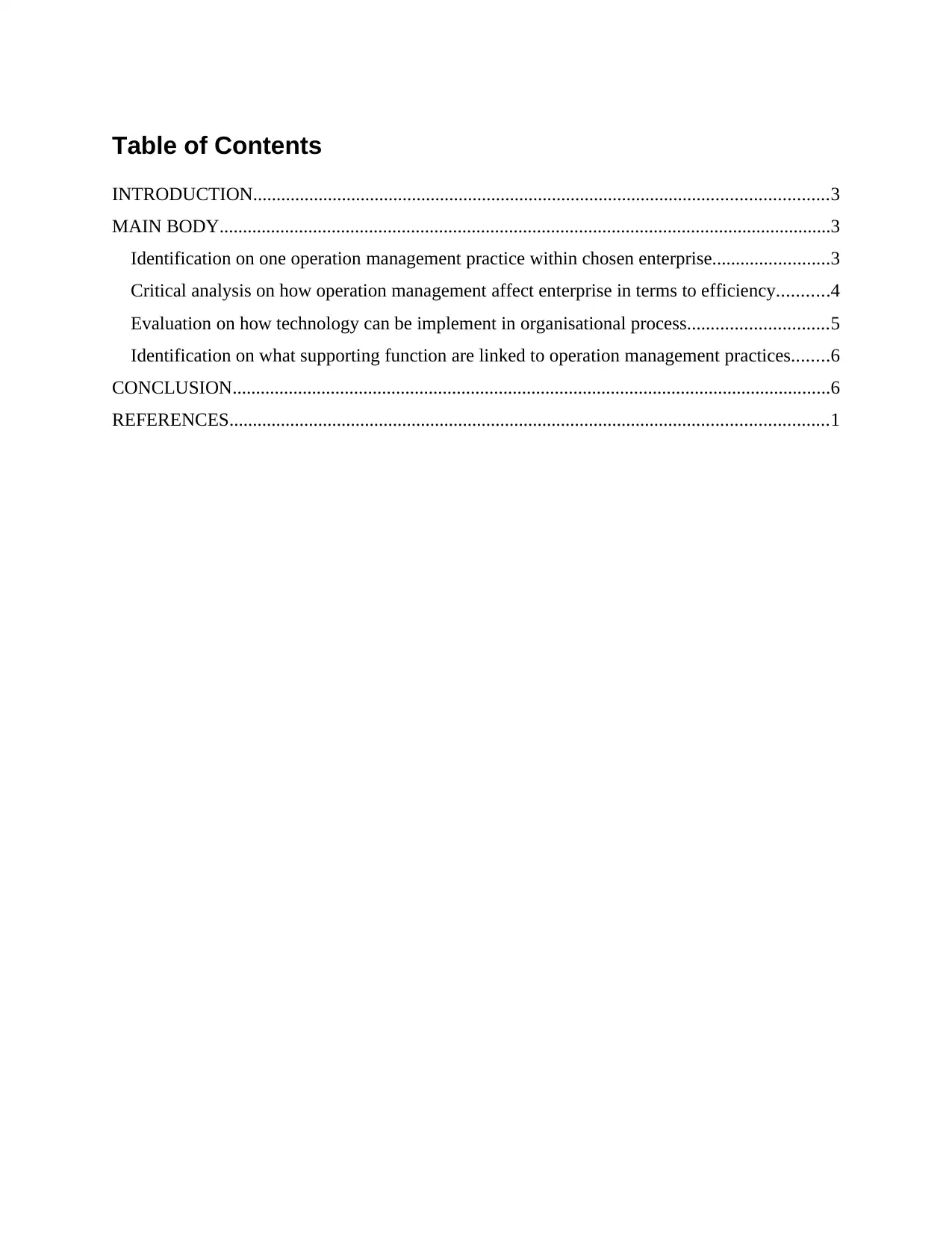
Table of Contents
INTRODUCTION...........................................................................................................................3
MAIN BODY...................................................................................................................................3
Identification on one operation management practice within chosen enterprise.........................3
Critical analysis on how operation management affect enterprise in terms to efficiency...........4
Evaluation on how technology can be implement in organisational process..............................5
Identification on what supporting function are linked to operation management practices........6
CONCLUSION................................................................................................................................6
REFERENCES................................................................................................................................1
INTRODUCTION...........................................................................................................................3
MAIN BODY...................................................................................................................................3
Identification on one operation management practice within chosen enterprise.........................3
Critical analysis on how operation management affect enterprise in terms to efficiency...........4
Evaluation on how technology can be implement in organisational process..............................5
Identification on what supporting function are linked to operation management practices........6
CONCLUSION................................................................................................................................6
REFERENCES................................................................................................................................1
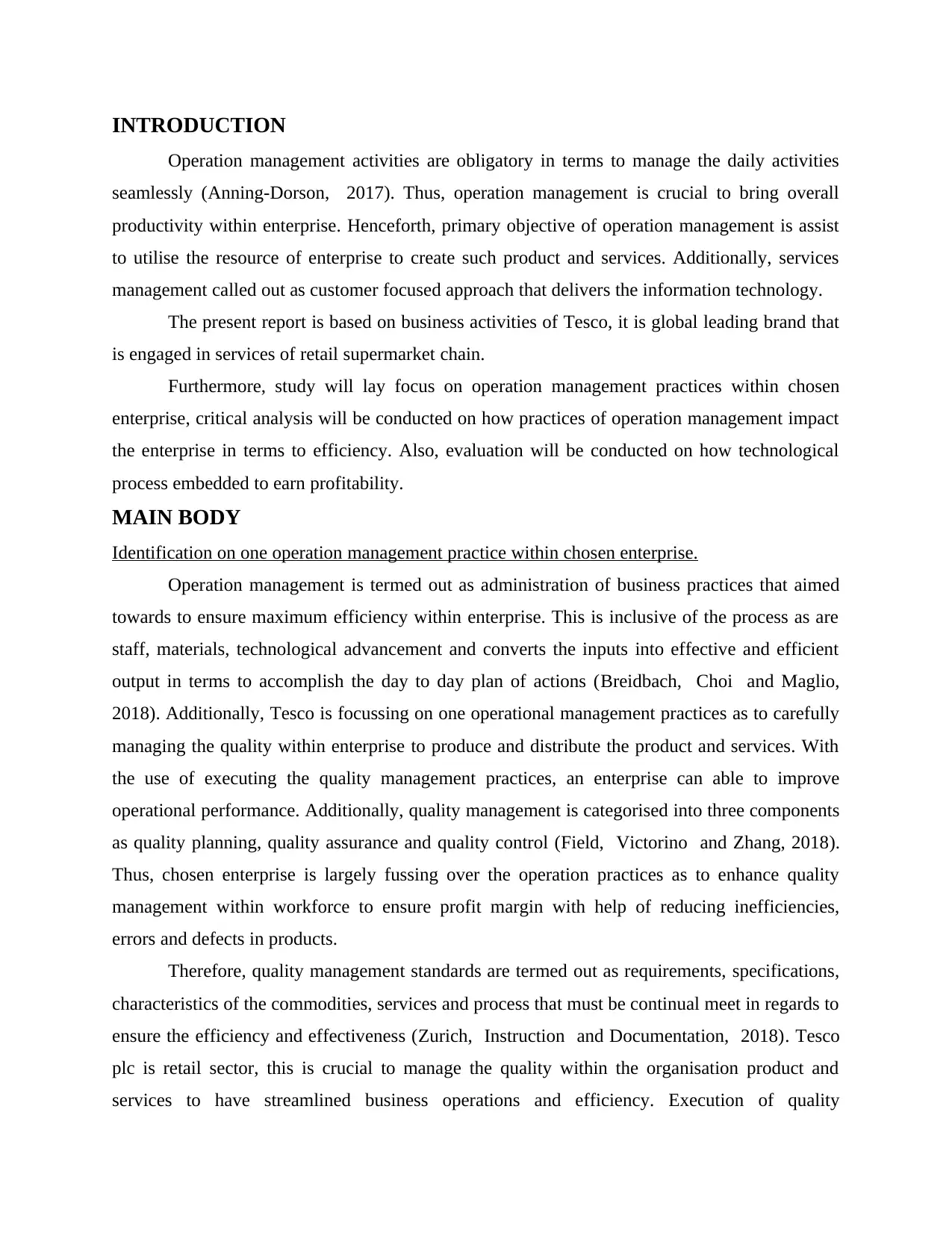
INTRODUCTION
Operation management activities are obligatory in terms to manage the daily activities
seamlessly (Anning-Dorson, 2017). Thus, operation management is crucial to bring overall
productivity within enterprise. Henceforth, primary objective of operation management is assist
to utilise the resource of enterprise to create such product and services. Additionally, services
management called out as customer focused approach that delivers the information technology.
The present report is based on business activities of Tesco, it is global leading brand that
is engaged in services of retail supermarket chain.
Furthermore, study will lay focus on operation management practices within chosen
enterprise, critical analysis will be conducted on how practices of operation management impact
the enterprise in terms to efficiency. Also, evaluation will be conducted on how technological
process embedded to earn profitability.
MAIN BODY
Identification on one operation management practice within chosen enterprise.
Operation management is termed out as administration of business practices that aimed
towards to ensure maximum efficiency within enterprise. This is inclusive of the process as are
staff, materials, technological advancement and converts the inputs into effective and efficient
output in terms to accomplish the day to day plan of actions (Breidbach, Choi and Maglio,
2018). Additionally, Tesco is focussing on one operational management practices as to carefully
managing the quality within enterprise to produce and distribute the product and services. With
the use of executing the quality management practices, an enterprise can able to improve
operational performance. Additionally, quality management is categorised into three components
as quality planning, quality assurance and quality control (Field, Victorino and Zhang, 2018).
Thus, chosen enterprise is largely fussing over the operation practices as to enhance quality
management within workforce to ensure profit margin with help of reducing inefficiencies,
errors and defects in products.
Therefore, quality management standards are termed out as requirements, specifications,
characteristics of the commodities, services and process that must be continual meet in regards to
ensure the efficiency and effectiveness (Zurich, Instruction and Documentation, 2018). Tesco
plc is retail sector, this is crucial to manage the quality within the organisation product and
services to have streamlined business operations and efficiency. Execution of quality
Operation management activities are obligatory in terms to manage the daily activities
seamlessly (Anning-Dorson, 2017). Thus, operation management is crucial to bring overall
productivity within enterprise. Henceforth, primary objective of operation management is assist
to utilise the resource of enterprise to create such product and services. Additionally, services
management called out as customer focused approach that delivers the information technology.
The present report is based on business activities of Tesco, it is global leading brand that
is engaged in services of retail supermarket chain.
Furthermore, study will lay focus on operation management practices within chosen
enterprise, critical analysis will be conducted on how practices of operation management impact
the enterprise in terms to efficiency. Also, evaluation will be conducted on how technological
process embedded to earn profitability.
MAIN BODY
Identification on one operation management practice within chosen enterprise.
Operation management is termed out as administration of business practices that aimed
towards to ensure maximum efficiency within enterprise. This is inclusive of the process as are
staff, materials, technological advancement and converts the inputs into effective and efficient
output in terms to accomplish the day to day plan of actions (Breidbach, Choi and Maglio,
2018). Additionally, Tesco is focussing on one operational management practices as to carefully
managing the quality within enterprise to produce and distribute the product and services. With
the use of executing the quality management practices, an enterprise can able to improve
operational performance. Additionally, quality management is categorised into three components
as quality planning, quality assurance and quality control (Field, Victorino and Zhang, 2018).
Thus, chosen enterprise is largely fussing over the operation practices as to enhance quality
management within workforce to ensure profit margin with help of reducing inefficiencies,
errors and defects in products.
Therefore, quality management standards are termed out as requirements, specifications,
characteristics of the commodities, services and process that must be continual meet in regards to
ensure the efficiency and effectiveness (Zurich, Instruction and Documentation, 2018). Tesco
plc is retail sector, this is crucial to manage the quality within the organisation product and
services to have streamlined business operations and efficiency. Execution of quality
⊘ This is a preview!⊘
Do you want full access?
Subscribe today to unlock all pages.

Trusted by 1+ million students worldwide
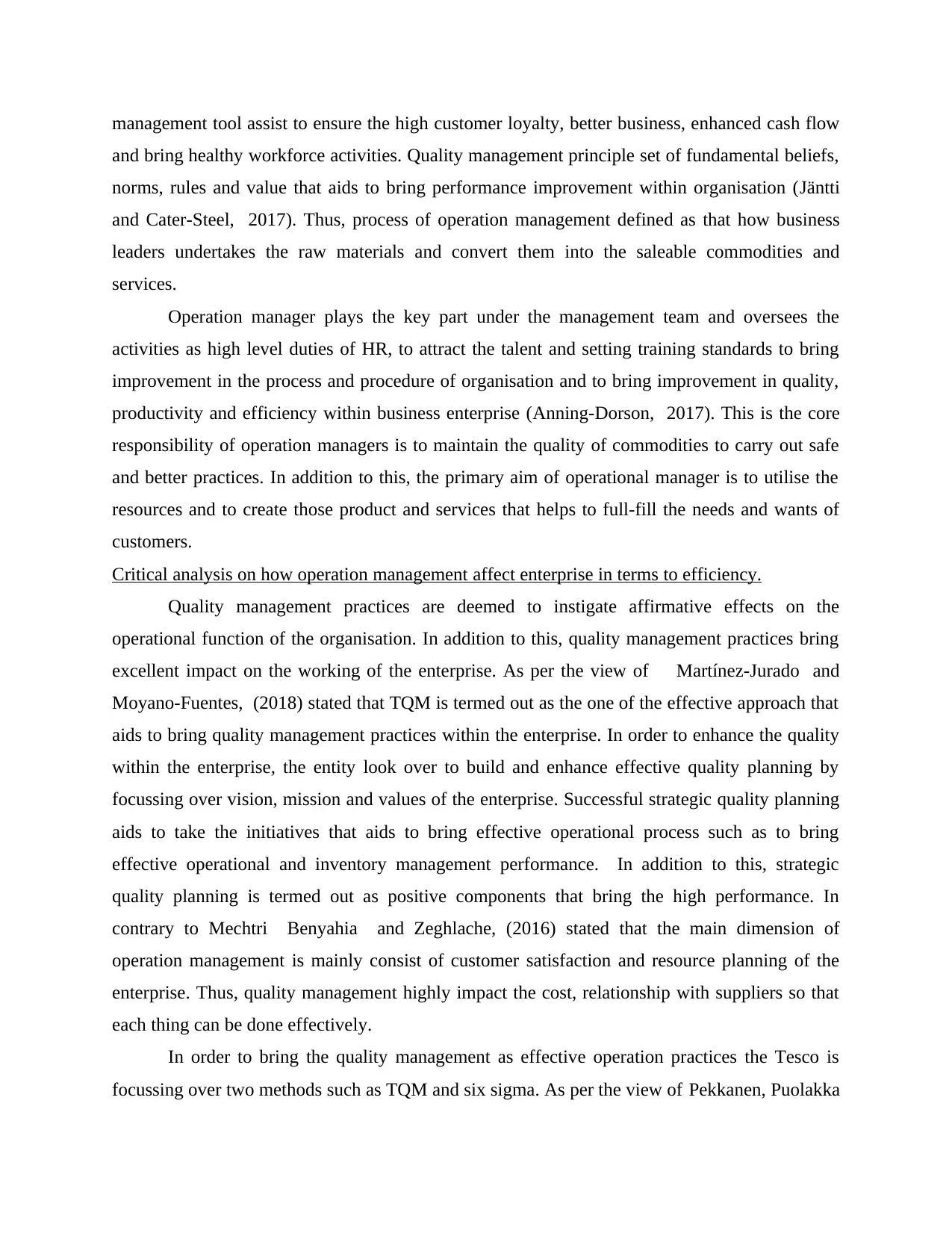
management tool assist to ensure the high customer loyalty, better business, enhanced cash flow
and bring healthy workforce activities. Quality management principle set of fundamental beliefs,
norms, rules and value that aids to bring performance improvement within organisation (Jäntti
and Cater-Steel, 2017). Thus, process of operation management defined as that how business
leaders undertakes the raw materials and convert them into the saleable commodities and
services.
Operation manager plays the key part under the management team and oversees the
activities as high level duties of HR, to attract the talent and setting training standards to bring
improvement in the process and procedure of organisation and to bring improvement in quality,
productivity and efficiency within business enterprise (Anning-Dorson, 2017). This is the core
responsibility of operation managers is to maintain the quality of commodities to carry out safe
and better practices. In addition to this, the primary aim of operational manager is to utilise the
resources and to create those product and services that helps to full-fill the needs and wants of
customers.
Critical analysis on how operation management affect enterprise in terms to efficiency.
Quality management practices are deemed to instigate affirmative effects on the
operational function of the organisation. In addition to this, quality management practices bring
excellent impact on the working of the enterprise. As per the view of Martínez-Jurado and
Moyano-Fuentes, (2018) stated that TQM is termed out as the one of the effective approach that
aids to bring quality management practices within the enterprise. In order to enhance the quality
within the enterprise, the entity look over to build and enhance effective quality planning by
focussing over vision, mission and values of the enterprise. Successful strategic quality planning
aids to take the initiatives that aids to bring effective operational process such as to bring
effective operational and inventory management performance. In addition to this, strategic
quality planning is termed out as positive components that bring the high performance. In
contrary to Mechtri Benyahia and Zeghlache, (2016) stated that the main dimension of
operation management is mainly consist of customer satisfaction and resource planning of the
enterprise. Thus, quality management highly impact the cost, relationship with suppliers so that
each thing can be done effectively.
In order to bring the quality management as effective operation practices the Tesco is
focussing over two methods such as TQM and six sigma. As per the view of Pekkanen, Puolakka
and bring healthy workforce activities. Quality management principle set of fundamental beliefs,
norms, rules and value that aids to bring performance improvement within organisation (Jäntti
and Cater-Steel, 2017). Thus, process of operation management defined as that how business
leaders undertakes the raw materials and convert them into the saleable commodities and
services.
Operation manager plays the key part under the management team and oversees the
activities as high level duties of HR, to attract the talent and setting training standards to bring
improvement in the process and procedure of organisation and to bring improvement in quality,
productivity and efficiency within business enterprise (Anning-Dorson, 2017). This is the core
responsibility of operation managers is to maintain the quality of commodities to carry out safe
and better practices. In addition to this, the primary aim of operational manager is to utilise the
resources and to create those product and services that helps to full-fill the needs and wants of
customers.
Critical analysis on how operation management affect enterprise in terms to efficiency.
Quality management practices are deemed to instigate affirmative effects on the
operational function of the organisation. In addition to this, quality management practices bring
excellent impact on the working of the enterprise. As per the view of Martínez-Jurado and
Moyano-Fuentes, (2018) stated that TQM is termed out as the one of the effective approach that
aids to bring quality management practices within the enterprise. In order to enhance the quality
within the enterprise, the entity look over to build and enhance effective quality planning by
focussing over vision, mission and values of the enterprise. Successful strategic quality planning
aids to take the initiatives that aids to bring effective operational process such as to bring
effective operational and inventory management performance. In addition to this, strategic
quality planning is termed out as positive components that bring the high performance. In
contrary to Mechtri Benyahia and Zeghlache, (2016) stated that the main dimension of
operation management is mainly consist of customer satisfaction and resource planning of the
enterprise. Thus, quality management highly impact the cost, relationship with suppliers so that
each thing can be done effectively.
In order to bring the quality management as effective operation practices the Tesco is
focussing over two methods such as TQM and six sigma. As per the view of Pekkanen, Puolakka
Paraphrase This Document
Need a fresh take? Get an instant paraphrase of this document with our AI Paraphraser
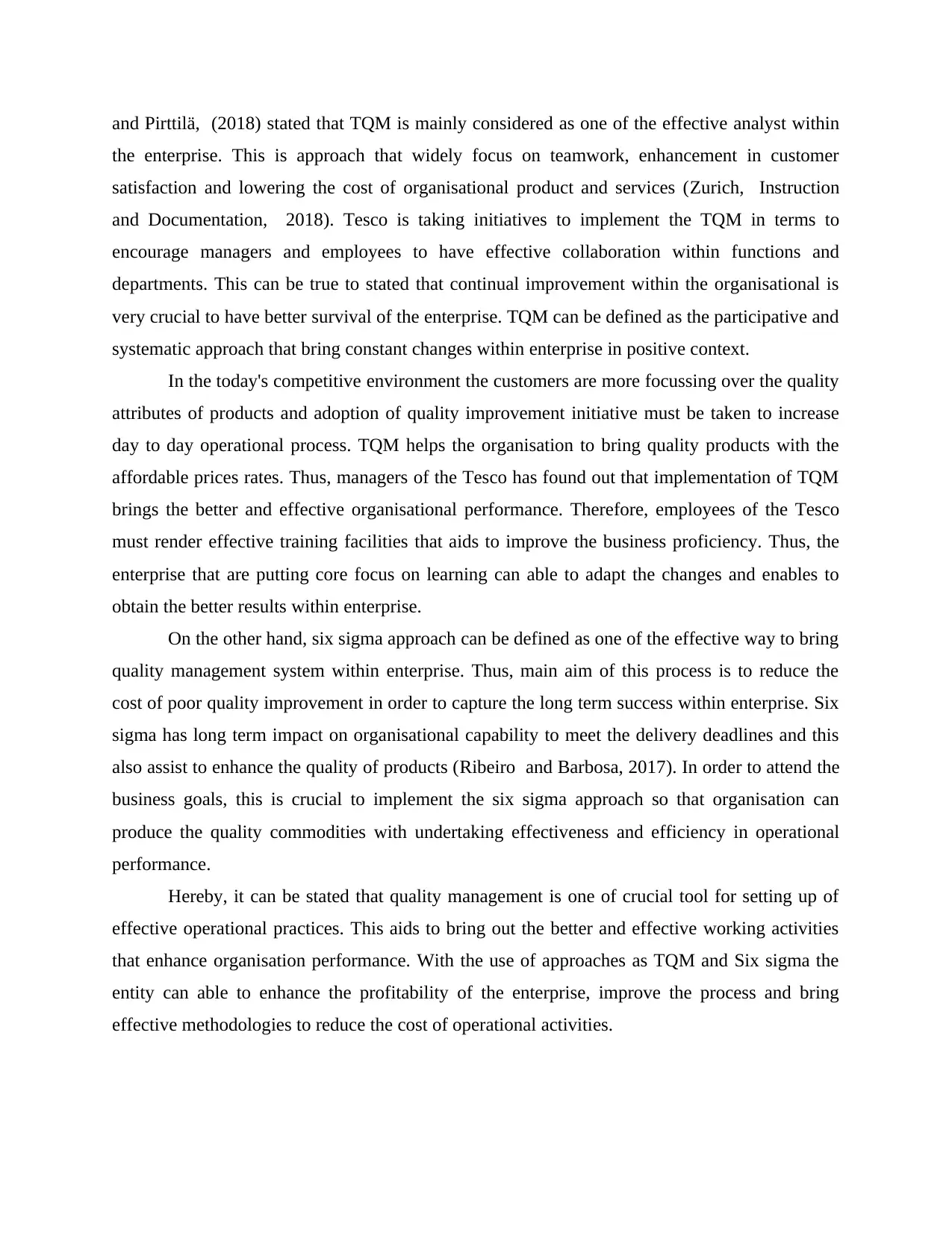
and Pirttilä, (2018) stated that TQM is mainly considered as one of the effective analyst within
the enterprise. This is approach that widely focus on teamwork, enhancement in customer
satisfaction and lowering the cost of organisational product and services (Zurich, Instruction
and Documentation, 2018). Tesco is taking initiatives to implement the TQM in terms to
encourage managers and employees to have effective collaboration within functions and
departments. This can be true to stated that continual improvement within the organisational is
very crucial to have better survival of the enterprise. TQM can be defined as the participative and
systematic approach that bring constant changes within enterprise in positive context.
In the today's competitive environment the customers are more focussing over the quality
attributes of products and adoption of quality improvement initiative must be taken to increase
day to day operational process. TQM helps the organisation to bring quality products with the
affordable prices rates. Thus, managers of the Tesco has found out that implementation of TQM
brings the better and effective organisational performance. Therefore, employees of the Tesco
must render effective training facilities that aids to improve the business proficiency. Thus, the
enterprise that are putting core focus on learning can able to adapt the changes and enables to
obtain the better results within enterprise.
On the other hand, six sigma approach can be defined as one of the effective way to bring
quality management system within enterprise. Thus, main aim of this process is to reduce the
cost of poor quality improvement in order to capture the long term success within enterprise. Six
sigma has long term impact on organisational capability to meet the delivery deadlines and this
also assist to enhance the quality of products (Ribeiro and Barbosa, 2017). In order to attend the
business goals, this is crucial to implement the six sigma approach so that organisation can
produce the quality commodities with undertaking effectiveness and efficiency in operational
performance.
Hereby, it can be stated that quality management is one of crucial tool for setting up of
effective operational practices. This aids to bring out the better and effective working activities
that enhance organisation performance. With the use of approaches as TQM and Six sigma the
entity can able to enhance the profitability of the enterprise, improve the process and bring
effective methodologies to reduce the cost of operational activities.
the enterprise. This is approach that widely focus on teamwork, enhancement in customer
satisfaction and lowering the cost of organisational product and services (Zurich, Instruction
and Documentation, 2018). Tesco is taking initiatives to implement the TQM in terms to
encourage managers and employees to have effective collaboration within functions and
departments. This can be true to stated that continual improvement within the organisational is
very crucial to have better survival of the enterprise. TQM can be defined as the participative and
systematic approach that bring constant changes within enterprise in positive context.
In the today's competitive environment the customers are more focussing over the quality
attributes of products and adoption of quality improvement initiative must be taken to increase
day to day operational process. TQM helps the organisation to bring quality products with the
affordable prices rates. Thus, managers of the Tesco has found out that implementation of TQM
brings the better and effective organisational performance. Therefore, employees of the Tesco
must render effective training facilities that aids to improve the business proficiency. Thus, the
enterprise that are putting core focus on learning can able to adapt the changes and enables to
obtain the better results within enterprise.
On the other hand, six sigma approach can be defined as one of the effective way to bring
quality management system within enterprise. Thus, main aim of this process is to reduce the
cost of poor quality improvement in order to capture the long term success within enterprise. Six
sigma has long term impact on organisational capability to meet the delivery deadlines and this
also assist to enhance the quality of products (Ribeiro and Barbosa, 2017). In order to attend the
business goals, this is crucial to implement the six sigma approach so that organisation can
produce the quality commodities with undertaking effectiveness and efficiency in operational
performance.
Hereby, it can be stated that quality management is one of crucial tool for setting up of
effective operational practices. This aids to bring out the better and effective working activities
that enhance organisation performance. With the use of approaches as TQM and Six sigma the
entity can able to enhance the profitability of the enterprise, improve the process and bring
effective methodologies to reduce the cost of operational activities.
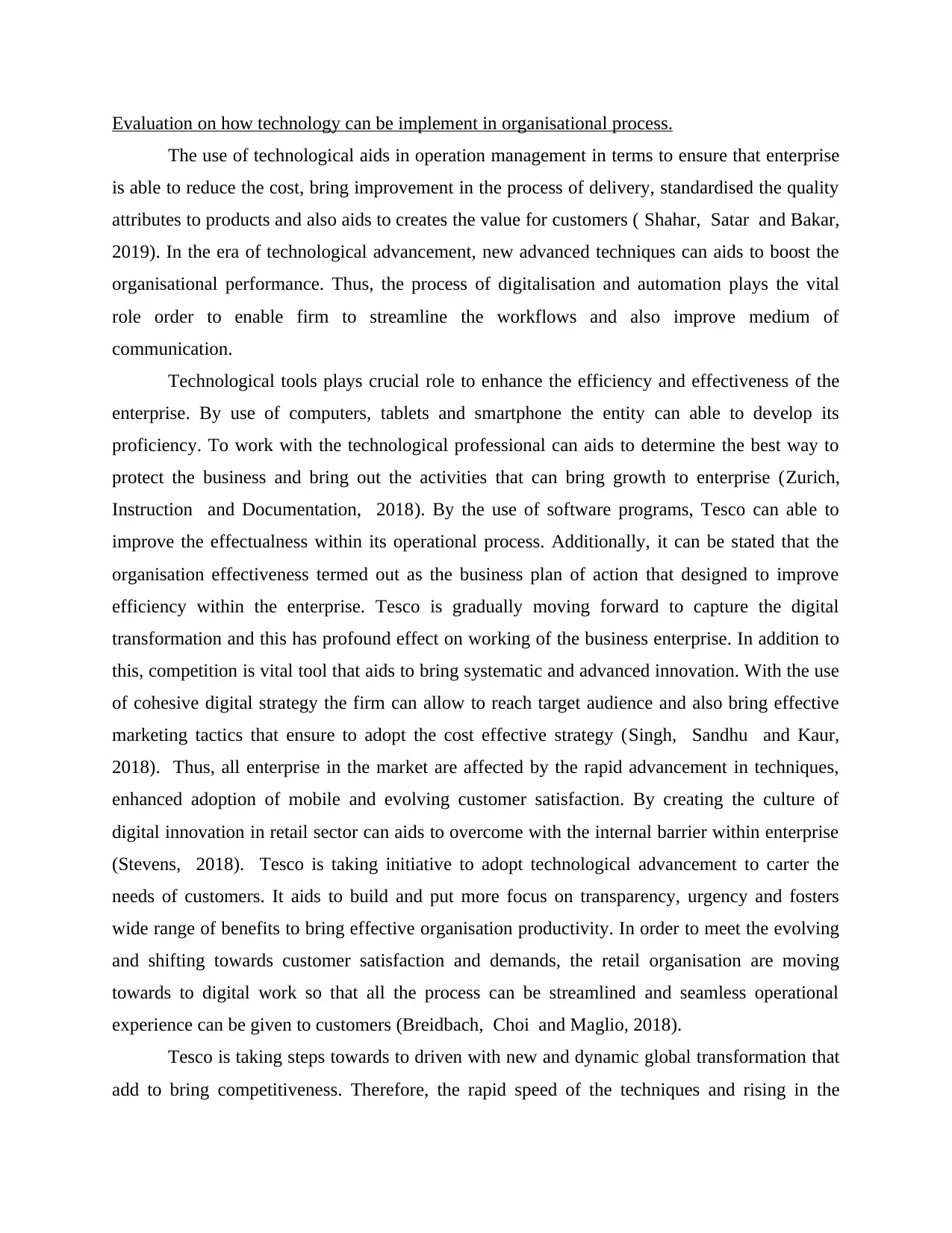
Evaluation on how technology can be implement in organisational process.
The use of technological aids in operation management in terms to ensure that enterprise
is able to reduce the cost, bring improvement in the process of delivery, standardised the quality
attributes to products and also aids to creates the value for customers ( Shahar, Satar and Bakar,
2019). In the era of technological advancement, new advanced techniques can aids to boost the
organisational performance. Thus, the process of digitalisation and automation plays the vital
role order to enable firm to streamline the workflows and also improve medium of
communication.
Technological tools plays crucial role to enhance the efficiency and effectiveness of the
enterprise. By use of computers, tablets and smartphone the entity can able to develop its
proficiency. To work with the technological professional can aids to determine the best way to
protect the business and bring out the activities that can bring growth to enterprise (Zurich,
Instruction and Documentation, 2018). By the use of software programs, Tesco can able to
improve the effectualness within its operational process. Additionally, it can be stated that the
organisation effectiveness termed out as the business plan of action that designed to improve
efficiency within the enterprise. Tesco is gradually moving forward to capture the digital
transformation and this has profound effect on working of the business enterprise. In addition to
this, competition is vital tool that aids to bring systematic and advanced innovation. With the use
of cohesive digital strategy the firm can allow to reach target audience and also bring effective
marketing tactics that ensure to adopt the cost effective strategy (Singh, Sandhu and Kaur,
2018). Thus, all enterprise in the market are affected by the rapid advancement in techniques,
enhanced adoption of mobile and evolving customer satisfaction. By creating the culture of
digital innovation in retail sector can aids to overcome with the internal barrier within enterprise
(Stevens, 2018). Tesco is taking initiative to adopt technological advancement to carter the
needs of customers. It aids to build and put more focus on transparency, urgency and fosters
wide range of benefits to bring effective organisation productivity. In order to meet the evolving
and shifting towards customer satisfaction and demands, the retail organisation are moving
towards to digital work so that all the process can be streamlined and seamless operational
experience can be given to customers (Breidbach, Choi and Maglio, 2018).
Tesco is taking steps towards to driven with new and dynamic global transformation that
add to bring competitiveness. Therefore, the rapid speed of the techniques and rising in the
The use of technological aids in operation management in terms to ensure that enterprise
is able to reduce the cost, bring improvement in the process of delivery, standardised the quality
attributes to products and also aids to creates the value for customers ( Shahar, Satar and Bakar,
2019). In the era of technological advancement, new advanced techniques can aids to boost the
organisational performance. Thus, the process of digitalisation and automation plays the vital
role order to enable firm to streamline the workflows and also improve medium of
communication.
Technological tools plays crucial role to enhance the efficiency and effectiveness of the
enterprise. By use of computers, tablets and smartphone the entity can able to develop its
proficiency. To work with the technological professional can aids to determine the best way to
protect the business and bring out the activities that can bring growth to enterprise (Zurich,
Instruction and Documentation, 2018). By the use of software programs, Tesco can able to
improve the effectualness within its operational process. Additionally, it can be stated that the
organisation effectiveness termed out as the business plan of action that designed to improve
efficiency within the enterprise. Tesco is gradually moving forward to capture the digital
transformation and this has profound effect on working of the business enterprise. In addition to
this, competition is vital tool that aids to bring systematic and advanced innovation. With the use
of cohesive digital strategy the firm can allow to reach target audience and also bring effective
marketing tactics that ensure to adopt the cost effective strategy (Singh, Sandhu and Kaur,
2018). Thus, all enterprise in the market are affected by the rapid advancement in techniques,
enhanced adoption of mobile and evolving customer satisfaction. By creating the culture of
digital innovation in retail sector can aids to overcome with the internal barrier within enterprise
(Stevens, 2018). Tesco is taking initiative to adopt technological advancement to carter the
needs of customers. It aids to build and put more focus on transparency, urgency and fosters
wide range of benefits to bring effective organisation productivity. In order to meet the evolving
and shifting towards customer satisfaction and demands, the retail organisation are moving
towards to digital work so that all the process can be streamlined and seamless operational
experience can be given to customers (Breidbach, Choi and Maglio, 2018).
Tesco is taking steps towards to driven with new and dynamic global transformation that
add to bring competitiveness. Therefore, the rapid speed of the techniques and rising in the
⊘ This is a preview!⊘
Do you want full access?
Subscribe today to unlock all pages.

Trusted by 1+ million students worldwide
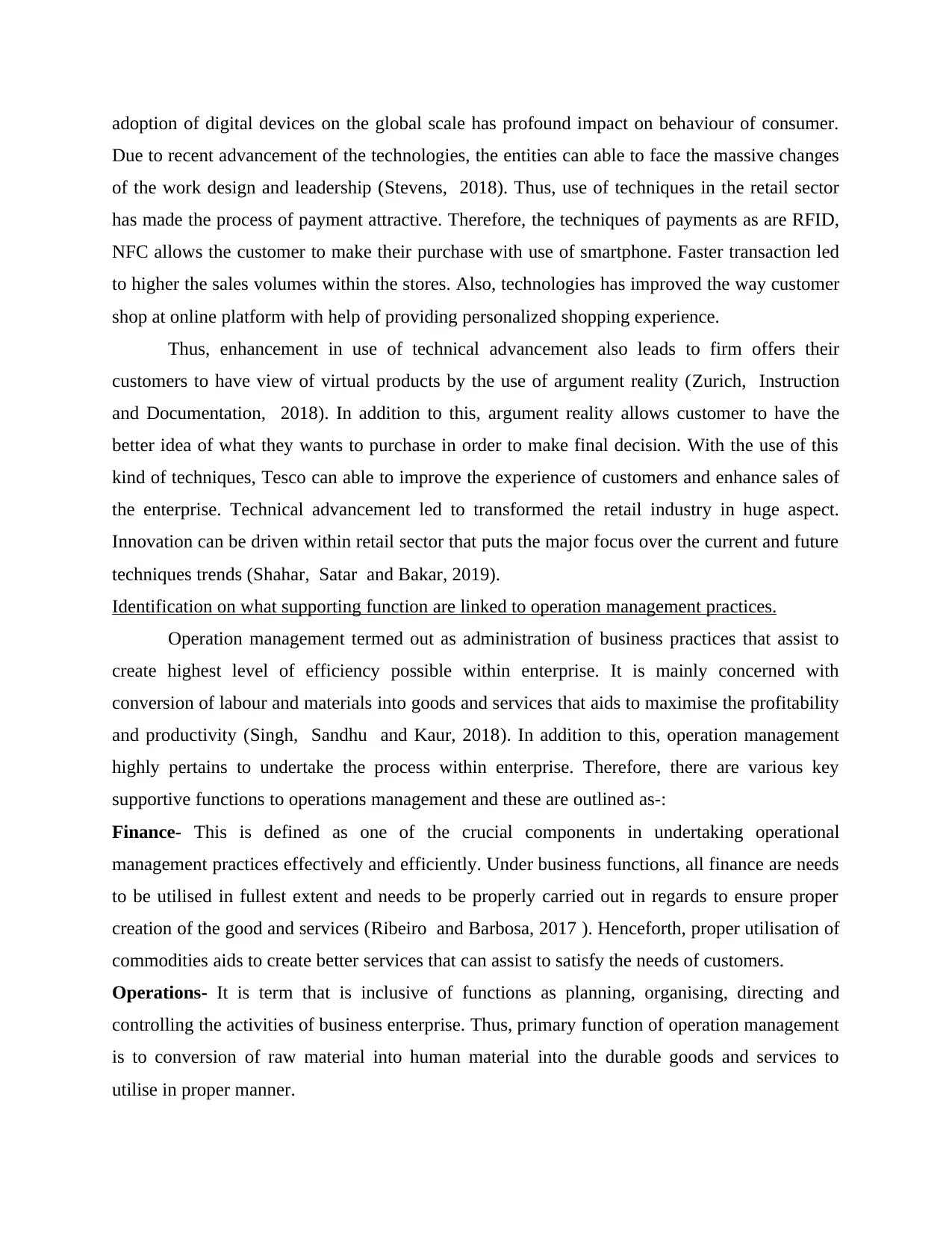
adoption of digital devices on the global scale has profound impact on behaviour of consumer.
Due to recent advancement of the technologies, the entities can able to face the massive changes
of the work design and leadership (Stevens, 2018). Thus, use of techniques in the retail sector
has made the process of payment attractive. Therefore, the techniques of payments as are RFID,
NFC allows the customer to make their purchase with use of smartphone. Faster transaction led
to higher the sales volumes within the stores. Also, technologies has improved the way customer
shop at online platform with help of providing personalized shopping experience.
Thus, enhancement in use of technical advancement also leads to firm offers their
customers to have view of virtual products by the use of argument reality (Zurich, Instruction
and Documentation, 2018). In addition to this, argument reality allows customer to have the
better idea of what they wants to purchase in order to make final decision. With the use of this
kind of techniques, Tesco can able to improve the experience of customers and enhance sales of
the enterprise. Technical advancement led to transformed the retail industry in huge aspect.
Innovation can be driven within retail sector that puts the major focus over the current and future
techniques trends (Shahar, Satar and Bakar, 2019).
Identification on what supporting function are linked to operation management practices.
Operation management termed out as administration of business practices that assist to
create highest level of efficiency possible within enterprise. It is mainly concerned with
conversion of labour and materials into goods and services that aids to maximise the profitability
and productivity (Singh, Sandhu and Kaur, 2018). In addition to this, operation management
highly pertains to undertake the process within enterprise. Therefore, there are various key
supportive functions to operations management and these are outlined as-:
Finance- This is defined as one of the crucial components in undertaking operational
management practices effectively and efficiently. Under business functions, all finance are needs
to be utilised in fullest extent and needs to be properly carried out in regards to ensure proper
creation of the good and services (Ribeiro and Barbosa, 2017 ). Henceforth, proper utilisation of
commodities aids to create better services that can assist to satisfy the needs of customers.
Operations- It is term that is inclusive of functions as planning, organising, directing and
controlling the activities of business enterprise. Thus, primary function of operation management
is to conversion of raw material into human material into the durable goods and services to
utilise in proper manner.
Due to recent advancement of the technologies, the entities can able to face the massive changes
of the work design and leadership (Stevens, 2018). Thus, use of techniques in the retail sector
has made the process of payment attractive. Therefore, the techniques of payments as are RFID,
NFC allows the customer to make their purchase with use of smartphone. Faster transaction led
to higher the sales volumes within the stores. Also, technologies has improved the way customer
shop at online platform with help of providing personalized shopping experience.
Thus, enhancement in use of technical advancement also leads to firm offers their
customers to have view of virtual products by the use of argument reality (Zurich, Instruction
and Documentation, 2018). In addition to this, argument reality allows customer to have the
better idea of what they wants to purchase in order to make final decision. With the use of this
kind of techniques, Tesco can able to improve the experience of customers and enhance sales of
the enterprise. Technical advancement led to transformed the retail industry in huge aspect.
Innovation can be driven within retail sector that puts the major focus over the current and future
techniques trends (Shahar, Satar and Bakar, 2019).
Identification on what supporting function are linked to operation management practices.
Operation management termed out as administration of business practices that assist to
create highest level of efficiency possible within enterprise. It is mainly concerned with
conversion of labour and materials into goods and services that aids to maximise the profitability
and productivity (Singh, Sandhu and Kaur, 2018). In addition to this, operation management
highly pertains to undertake the process within enterprise. Therefore, there are various key
supportive functions to operations management and these are outlined as-:
Finance- This is defined as one of the crucial components in undertaking operational
management practices effectively and efficiently. Under business functions, all finance are needs
to be utilised in fullest extent and needs to be properly carried out in regards to ensure proper
creation of the good and services (Ribeiro and Barbosa, 2017 ). Henceforth, proper utilisation of
commodities aids to create better services that can assist to satisfy the needs of customers.
Operations- It is term that is inclusive of functions as planning, organising, directing and
controlling the activities of business enterprise. Thus, primary function of operation management
is to conversion of raw material into human material into the durable goods and services to
utilise in proper manner.
Paraphrase This Document
Need a fresh take? Get an instant paraphrase of this document with our AI Paraphraser
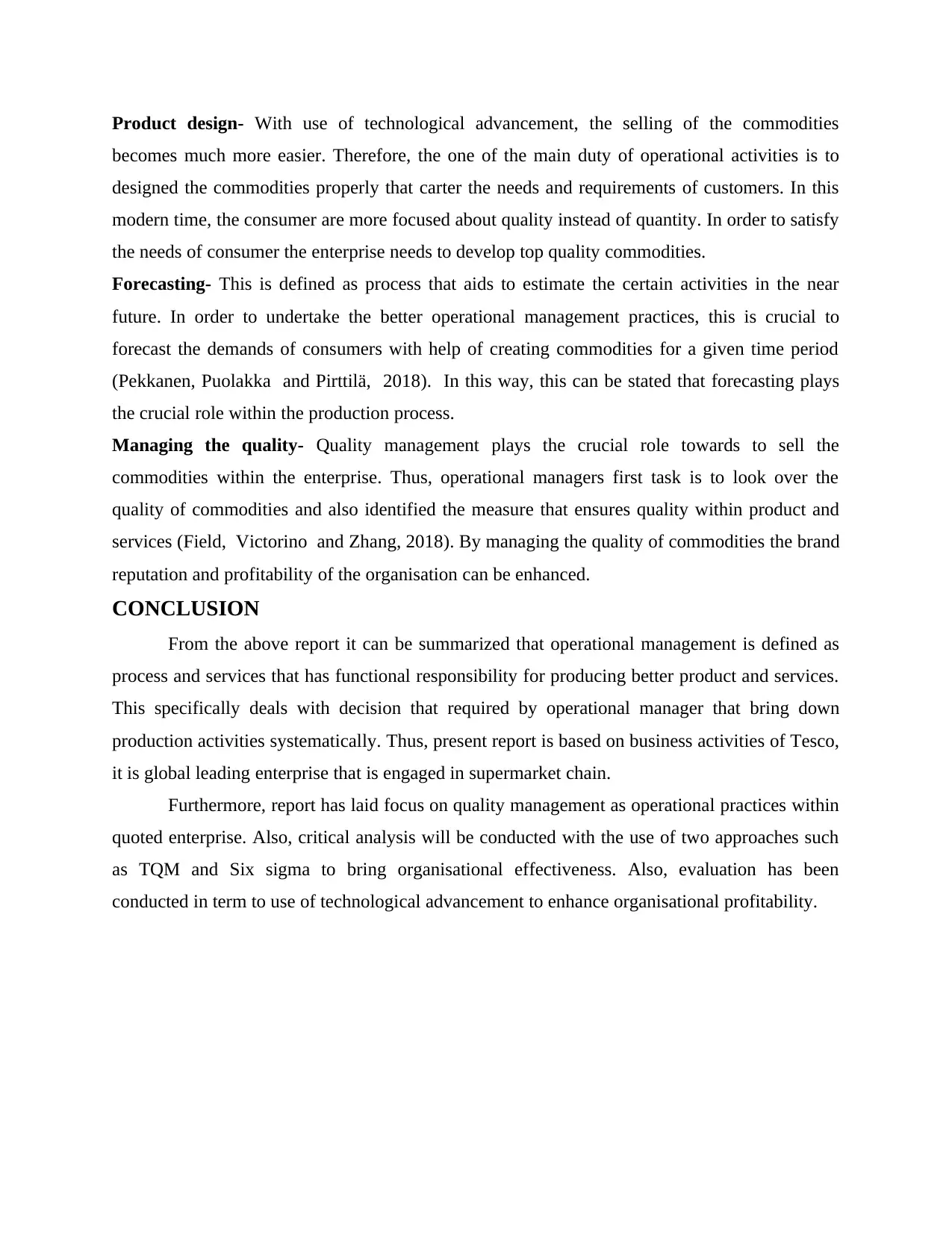
Product design- With use of technological advancement, the selling of the commodities
becomes much more easier. Therefore, the one of the main duty of operational activities is to
designed the commodities properly that carter the needs and requirements of customers. In this
modern time, the consumer are more focused about quality instead of quantity. In order to satisfy
the needs of consumer the enterprise needs to develop top quality commodities.
Forecasting- This is defined as process that aids to estimate the certain activities in the near
future. In order to undertake the better operational management practices, this is crucial to
forecast the demands of consumers with help of creating commodities for a given time period
(Pekkanen, Puolakka and Pirttilä, 2018). In this way, this can be stated that forecasting plays
the crucial role within the production process.
Managing the quality- Quality management plays the crucial role towards to sell the
commodities within the enterprise. Thus, operational managers first task is to look over the
quality of commodities and also identified the measure that ensures quality within product and
services (Field, Victorino and Zhang, 2018). By managing the quality of commodities the brand
reputation and profitability of the organisation can be enhanced.
CONCLUSION
From the above report it can be summarized that operational management is defined as
process and services that has functional responsibility for producing better product and services.
This specifically deals with decision that required by operational manager that bring down
production activities systematically. Thus, present report is based on business activities of Tesco,
it is global leading enterprise that is engaged in supermarket chain.
Furthermore, report has laid focus on quality management as operational practices within
quoted enterprise. Also, critical analysis will be conducted with the use of two approaches such
as TQM and Six sigma to bring organisational effectiveness. Also, evaluation has been
conducted in term to use of technological advancement to enhance organisational profitability.
becomes much more easier. Therefore, the one of the main duty of operational activities is to
designed the commodities properly that carter the needs and requirements of customers. In this
modern time, the consumer are more focused about quality instead of quantity. In order to satisfy
the needs of consumer the enterprise needs to develop top quality commodities.
Forecasting- This is defined as process that aids to estimate the certain activities in the near
future. In order to undertake the better operational management practices, this is crucial to
forecast the demands of consumers with help of creating commodities for a given time period
(Pekkanen, Puolakka and Pirttilä, 2018). In this way, this can be stated that forecasting plays
the crucial role within the production process.
Managing the quality- Quality management plays the crucial role towards to sell the
commodities within the enterprise. Thus, operational managers first task is to look over the
quality of commodities and also identified the measure that ensures quality within product and
services (Field, Victorino and Zhang, 2018). By managing the quality of commodities the brand
reputation and profitability of the organisation can be enhanced.
CONCLUSION
From the above report it can be summarized that operational management is defined as
process and services that has functional responsibility for producing better product and services.
This specifically deals with decision that required by operational manager that bring down
production activities systematically. Thus, present report is based on business activities of Tesco,
it is global leading enterprise that is engaged in supermarket chain.
Furthermore, report has laid focus on quality management as operational practices within
quoted enterprise. Also, critical analysis will be conducted with the use of two approaches such
as TQM and Six sigma to bring organisational effectiveness. Also, evaluation has been
conducted in term to use of technological advancement to enhance organisational profitability.
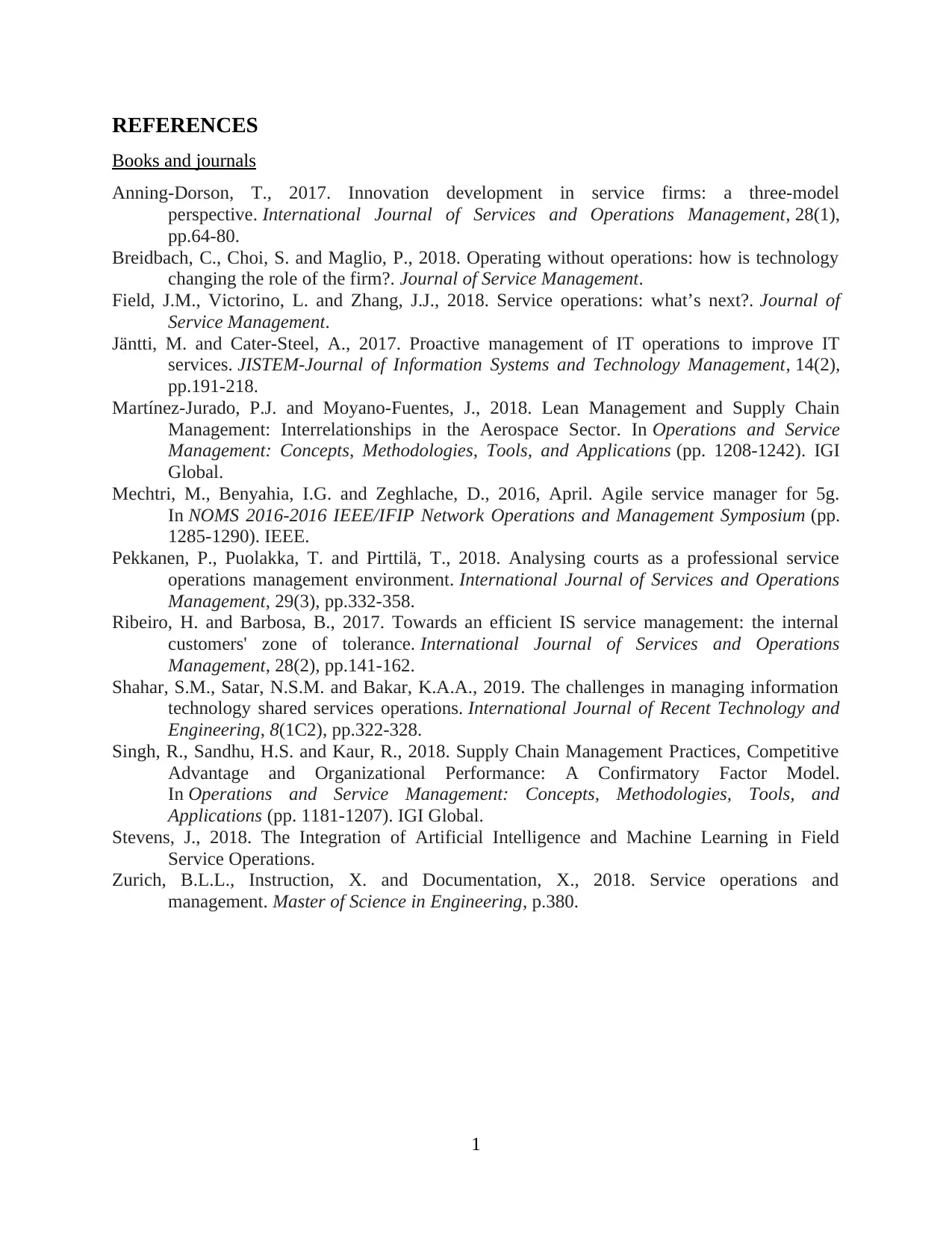
REFERENCES
Books and journals
Anning-Dorson, T., 2017. Innovation development in service firms: a three-model
perspective. International Journal of Services and Operations Management, 28(1),
pp.64-80.
Breidbach, C., Choi, S. and Maglio, P., 2018. Operating without operations: how is technology
changing the role of the firm?. Journal of Service Management.
Field, J.M., Victorino, L. and Zhang, J.J., 2018. Service operations: what’s next?. Journal of
Service Management.
Jäntti, M. and Cater-Steel, A., 2017. Proactive management of IT operations to improve IT
services. JISTEM-Journal of Information Systems and Technology Management, 14(2),
pp.191-218.
Martínez-Jurado, P.J. and Moyano-Fuentes, J., 2018. Lean Management and Supply Chain
Management: Interrelationships in the Aerospace Sector. In Operations and Service
Management: Concepts, Methodologies, Tools, and Applications (pp. 1208-1242). IGI
Global.
Mechtri, M., Benyahia, I.G. and Zeghlache, D., 2016, April. Agile service manager for 5g.
In NOMS 2016-2016 IEEE/IFIP Network Operations and Management Symposium (pp.
1285-1290). IEEE.
Pekkanen, P., Puolakka, T. and Pirttilä, T., 2018. Analysing courts as a professional service
operations management environment. International Journal of Services and Operations
Management, 29(3), pp.332-358.
Ribeiro, H. and Barbosa, B., 2017. Towards an efficient IS service management: the internal
customers' zone of tolerance. International Journal of Services and Operations
Management, 28(2), pp.141-162.
Shahar, S.M., Satar, N.S.M. and Bakar, K.A.A., 2019. The challenges in managing information
technology shared services operations. International Journal of Recent Technology and
Engineering, 8(1C2), pp.322-328.
Singh, R., Sandhu, H.S. and Kaur, R., 2018. Supply Chain Management Practices, Competitive
Advantage and Organizational Performance: A Confirmatory Factor Model.
In Operations and Service Management: Concepts, Methodologies, Tools, and
Applications (pp. 1181-1207). IGI Global.
Stevens, J., 2018. The Integration of Artificial Intelligence and Machine Learning in Field
Service Operations.
Zurich, B.L.L., Instruction, X. and Documentation, X., 2018. Service operations and
management. Master of Science in Engineering, p.380.
1
Books and journals
Anning-Dorson, T., 2017. Innovation development in service firms: a three-model
perspective. International Journal of Services and Operations Management, 28(1),
pp.64-80.
Breidbach, C., Choi, S. and Maglio, P., 2018. Operating without operations: how is technology
changing the role of the firm?. Journal of Service Management.
Field, J.M., Victorino, L. and Zhang, J.J., 2018. Service operations: what’s next?. Journal of
Service Management.
Jäntti, M. and Cater-Steel, A., 2017. Proactive management of IT operations to improve IT
services. JISTEM-Journal of Information Systems and Technology Management, 14(2),
pp.191-218.
Martínez-Jurado, P.J. and Moyano-Fuentes, J., 2018. Lean Management and Supply Chain
Management: Interrelationships in the Aerospace Sector. In Operations and Service
Management: Concepts, Methodologies, Tools, and Applications (pp. 1208-1242). IGI
Global.
Mechtri, M., Benyahia, I.G. and Zeghlache, D., 2016, April. Agile service manager for 5g.
In NOMS 2016-2016 IEEE/IFIP Network Operations and Management Symposium (pp.
1285-1290). IEEE.
Pekkanen, P., Puolakka, T. and Pirttilä, T., 2018. Analysing courts as a professional service
operations management environment. International Journal of Services and Operations
Management, 29(3), pp.332-358.
Ribeiro, H. and Barbosa, B., 2017. Towards an efficient IS service management: the internal
customers' zone of tolerance. International Journal of Services and Operations
Management, 28(2), pp.141-162.
Shahar, S.M., Satar, N.S.M. and Bakar, K.A.A., 2019. The challenges in managing information
technology shared services operations. International Journal of Recent Technology and
Engineering, 8(1C2), pp.322-328.
Singh, R., Sandhu, H.S. and Kaur, R., 2018. Supply Chain Management Practices, Competitive
Advantage and Organizational Performance: A Confirmatory Factor Model.
In Operations and Service Management: Concepts, Methodologies, Tools, and
Applications (pp. 1181-1207). IGI Global.
Stevens, J., 2018. The Integration of Artificial Intelligence and Machine Learning in Field
Service Operations.
Zurich, B.L.L., Instruction, X. and Documentation, X., 2018. Service operations and
management. Master of Science in Engineering, p.380.
1
⊘ This is a preview!⊘
Do you want full access?
Subscribe today to unlock all pages.

Trusted by 1+ million students worldwide

2
1 out of 10
Related Documents
Your All-in-One AI-Powered Toolkit for Academic Success.
+13062052269
info@desklib.com
Available 24*7 on WhatsApp / Email
![[object Object]](/_next/static/media/star-bottom.7253800d.svg)
Unlock your academic potential
Copyright © 2020–2026 A2Z Services. All Rights Reserved. Developed and managed by ZUCOL.



